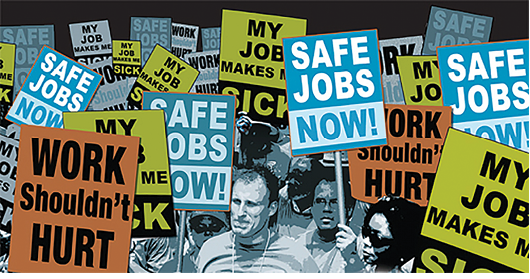A Criminal Gets Off Easy
May 1, 2016
(This article first appeared in the May-June 2016 issue of The American Postal Worker magazine.)
You may have heard recently of the conviction of a criminal named Don Blankenship. He was sentenced to one year in prison.
I am one who believes our country’s prisons are far too full of people who have been jailed for minor offenses – a product of a privatized prison-industrial complex that has to put and keep people behind bars to make money.
Based on Blankenship’s short sentence, you might think he committed a minor offense.
Think again.
Directly Responsible
Don Blankenship was directly responsible for killing 29 people. His sentence shows just how little a worker’s life is worth in our country’s corporate-dominated system of profit and greed.
In April 2010, a coal dust explosion at the Upper Big Branch Mine in Whitesville, West Virginia, took the lives of 29 miners. At the time, the mine was owned by Massey Energy, the third largest coal producer in the U.S. and the largest in Appalachia. The disaster was preventable.
Blankenship was the CEO.
Since 1994 more than 3,000 safety citations had been issued against the mine for poor ventilation, failure to establish proper escape routes, the build-up of dust and methane gas and other hazards. Virtually none of these safety violations, which existed for years, were fixed by the company. And none were addressed by the government or the courts in any meaningful way.
These very same flagrant safety violations led to the explosion and the death of the 29 workers.Massey and CEO Blankenship laughed all the way to the bank. In 2009, the year before the explosion, Massey made a profit of over $100 million. Blankenship’s pay increased from over $11 million in 2008 to $17.8 million in 2009.
The day after the disaster, Blankenship flippantly said that safety violations were simply a “normal part” of the mining industry.
Wealth Wields Power
Blankenship used his wealth to wield significant political power in Appalachia and beyond. At the time of the disaster he sat on the board of directors of the U.S. Chamber of Commerce – a corporate bulwark against workers’ rights and unions.
He is a big financial contributor to anti-union, anti-worker politicians, with his money and political influence specifically aimed at reducing safety regulation in the coal mines. In 2007, a judge he helped get elected to the West Virginia Supreme Court of Appeals threw out a $50 million fine against Massey.
Workers at the Upper Big Branch mine were not unionized: Blankenship had met with them directly and threatened to close the mine if they voted for a union.
There you have it. Twenty-nine lives lost. Twenty-nine families broken. A community shattered. And a misdemeanor charge for “conspiring to violate federal mine safety standards.”
Oh yes, the judge overseeing the case ordered the poor multi-millionaire to pay $250,000 in fines, but absolved him of any obligation to make restitution to the devastated families of the miners who died.
Stand Up for Safe Jobs!
Every year, 5,000 to 10,000 workers in the United States die in workplace accidents. Annually, hundreds of thousands die prematurely from workplace-related diseases. Millions are injured.
Unfortunately, the Postal Service is no exception: 18 workers died in workplace accidents in 2015, and 42,000 were injured.
Workers Memorial Day, observed every year on April 28, has once again come and gone. The AFL-CIO-sponsored commemoration shines a spotlight on the deaths and injuries workers suffer and the need to redouble our efforts in the fight for safe workplaces. Toward that goal, I hope all of you will join the APWU “Stand Up for Safe Jobs” campaign we instituted last fall. (See page 31.)
The Massey Massacre of our miner brothers who were compelled to work under such deadly conditions and the “kid gloves” treatment of those responsible for their deaths is a powerful reminder that those in power do not care one iota about us.
It’s up to us to care about ourselves and each other. The poisoning of the people of Flint, Michigan, is just another tragic example of profit being put before people. (See article below.)
The Blankenship scandal is a powerful impetus to rebuild our labor movement – our lives truly depend on it.
Let’s build the kind of power where those who poison, crush, and kill us face the punishment they deserve and, more importantly, where no worker is injured or dies at the altar of profit and greed.
APWU Donates to Flint

From left: Roscoe Woods, Pat Comben, Dr. Hanna-Attisha, Mike Mize and Amy Puhalski.
In the wake of the Flint water crisis, APWU leaders in Michigan presented a contribution from the national union to the Flint Child Health and Development Fund. The crisis developed after an “emergency manager” appointed by Gov. Rick Snyder (R) switched the source of Flint’s drinking water from Lake Huron to the Flint River in 2014 to cut costs.
The water supply was soon contaminated with lead, which causes health problems, including cognitive impairment, especially in children. The donation will be put towards child services in Flint, such as education, nutrition and behavioral health.
The union wanted to find a way to have a long-term effect, said Mike Mize, president of the Flint Area Local APWU and the Michigan Postal Workers Union. “We wanted to give more to the community than a temporary fix,” he explained.
On Feb. 23, Mize, along with Roscoe Woods, president of the 480-481 Area Local; Pat Comben, president of the Farmington Local, and Amy Puhalski, president of the Western Michigan Area Local, presented the union’s contribution to Dr. Mona Hanna-Attisha.
Several Michigan locals have made donations to the United Way that are earmarked for the Flint crisis. Contributions have been coming in from locals across the country.



